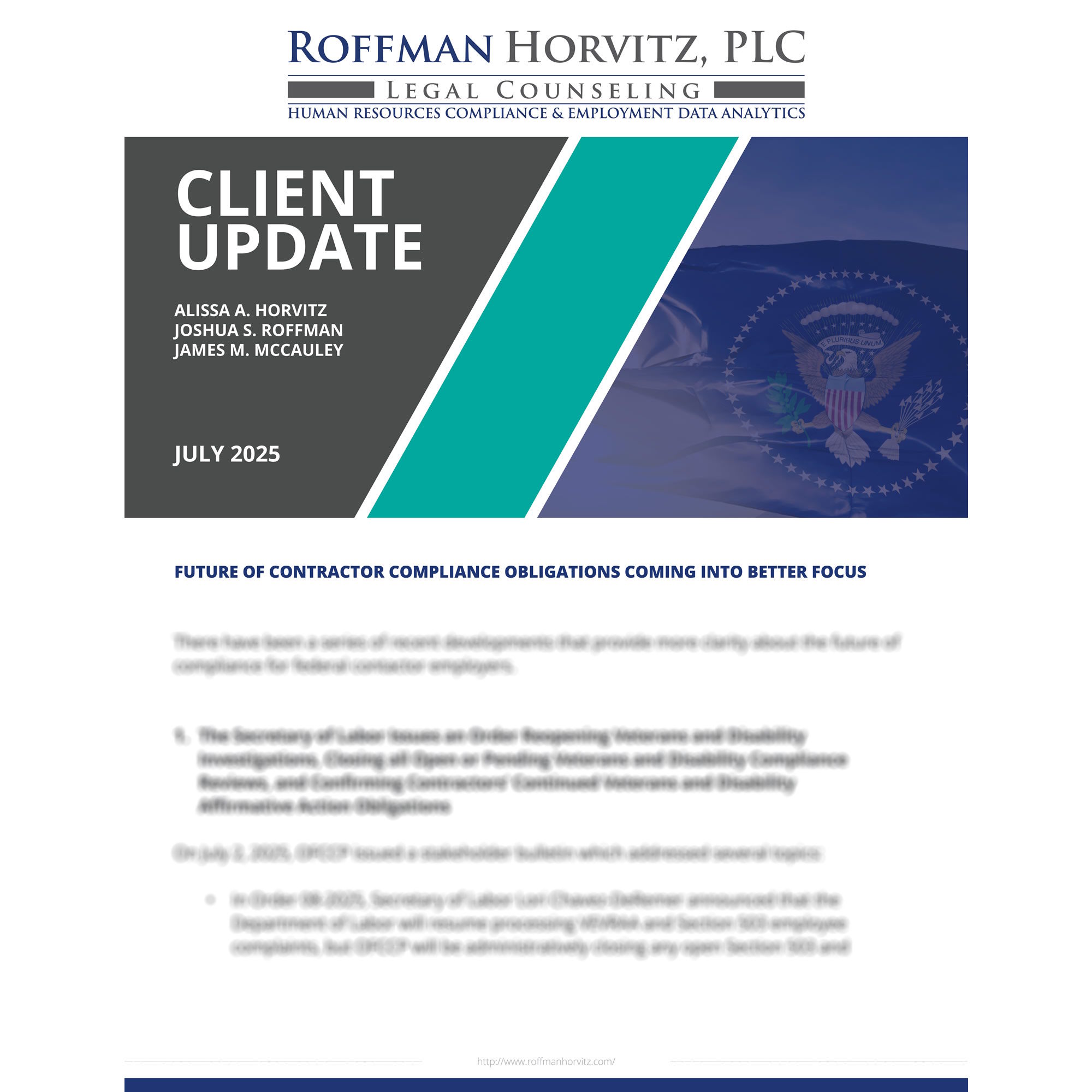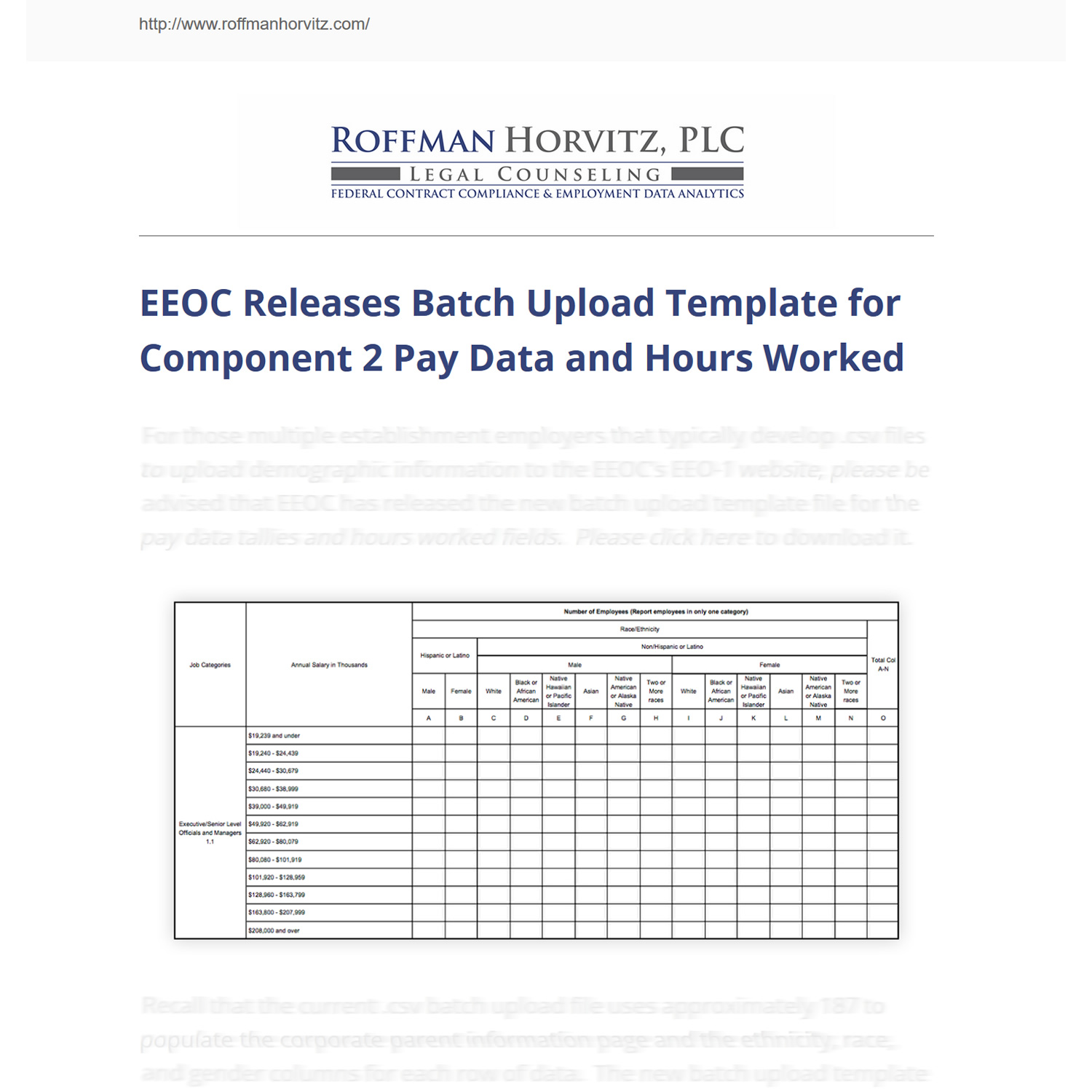Directive (DIR) 2018-07
U.S. DEPARTMENT OF LABOR
Office of Federal Contract Compliance Programs
A Directive (DIR) is intended to provide guidance to OFCCP staff or federal contractors on enforcement and compliance policy or procedures. A DIR does not change the laws and regulations governing OFCCP's programs and does not establish any legally enforceable rights or obligations.
Effective Date: August 24 , 2018
- SUBJECT: Affirmative Action Program Verification Initiative
- PURPOSE: To implement a verification process with the objective of ensuring that all covered federal contractors are meeting the most basic equal employment opportunity (EEO) regulatory requirement, namely, the preparation of a written affirmative action program (AAP) and annual updates to that program This will help American workers by ensuring that all covered federal contractors have AAPs, which will result in enhanced equal employment opportunity, more contractor outreach to available workers, and a more diverse workforce.
- REFERENCES:
- Executive Order (EO) 11246, Sept. 24, 1965, as amended.
- Section 503 of the Rehabilitation Act of 1973, as amended, 29 U.S.C. 793 (Section 503).
- Vietnam Era Veterans' Readjustment Assistance Act of 1974, as amended, 38 U.S.C. 4212 (VEVRAA).
- 41 CFR 60-1.40 and 41 CFR 60-2.1 through 60-2.17 (Executive Order Affirmative Action Program).
- 41 CFR 60-741.40 through 60-741.47 (Section 503 Affirmative Action Program).
- 41 CFR 60-300.40 through 60-300.45 (VEVRAA Affirmative Action Program).
- AFFECTED POLICY: None
- BACKGROUND: OFCCP enforces EO 11246, Section 503, and VEVRAA. Collectively, these laws prohibit federal contractors and subcontractors from discriminating on the basis of race, color, religion, sex, sexual orientation, gender identity, national origin, disability or status as a protected veteran.1 They also require federal contractors to take affirmative steps to ensure equal employment opportunity in their employment processes. Contractors also are prohibited from discriminating against applicants or employees because they inquire about, discuss, or disclose their compensation or that of others, subject to certain limitations.
OFCCP currently has jurisdiction over an estimated 120,000 contractor establishments and approximately 24,000 firms or parent companies. Based on the size of the contractor population and other factors, OFCCP schedules only a portion of these establishments annually for compliance evaluations. Therefore, OFCCP must seek more ways to expand its compliance reach.
OFCCP is concerned that many federal contractors are not fulfilling their legal duty to develop and maintain AAPs and update them on an annual basis. The U.S. Government Accountability Office (GAO) in its report, Equal Employment Opportunity: Strengthening Oversight Could Improve Federal Contractor Nondiscrimination Compliance (GAO-16-750), expressed concern that "OFCCP has no process for ensuring that the tens of thousands of establishments that have signed a qualifying federal contract have developed an AAP within 120 days of the commencement of the contract, or updated it annually." 2 The report further found that "close to 85 percent of contractor establishments did not submit a written AAP within 30 days of receiving a scheduling letter."3 Based on these findings, GAO recommended that OFCCP "[d]evelop a mechanism to monitor AAPs from covered federal contractors on a regular basis. Such a mechanism could include electronically collecting AAPs and contractor certification of annual updates."
Under OFCCP's current compliance review processes, federal contractor establishments have a small likelihood of discovery if they decide not to develop and update an AAP. This initiative squarely addresses this barrier to achieving comprehensive compliance by establishing a program for verification of compliance by all contractors with AAP obligations.4 This verification would initially take the form of OFCCP review of a certification, followed by potential compliance checks, and could later take the form of annual submission of AAPs to OFCCP for review.
In addition, this initiative will allow OFCCP to incorporate AAP certification information as a criterion in its methodology for neutrally scheduling compliance evaluations so that entities that have not developed and maintained AAPs are more likely to be scheduled. The failure to develop and update an AAP violates threshold contractual and legal obligations, and indicates a lack of commitment to comply with equal employment opportunity and anti-discrimination obligations.5 Accordingly, in situations where contractor establishments fail to comply with the AAP requirement, the likelihood of other violations, including discrimination, may be higher. Thus, OFCCP believes that this new criterion could be effective at identifying potential violators of the authorities OFCCP enforces.
This initiative will also help ensure there are no "free riders" that benefit from participating in the federal procurement process while not bearing the corresponding costs of AAP compliance based on the current high likelihood they will not be listed (and potentially receiving an inequitable advantage over law abiding contractors).
Finally, this initiative will also help federal contractors by emphasizing the importance of EEO requirements and encouraging these departments to contact OFCCP to seek compliance assistance in developing AAPs.
- DEFINITIONS: For definitions of the terms "government contract," "subcontract," "prime contractor," and "subcontractor" see 41 CFR § 60-1.3 (EO 11246); 41 CFR § 60-300.2 (VEVRAA); and 41 CFR § 60-741.2 (Section 503).
- POLICY: OFCCP will develop a comprehensive program to verify that federal contractors are complying with AAP obligations on a yearly basis.
This program includes:- Development of a process whereby contractors would certify on a yearly basis compliance with AAP requirements. 6
- Inclusion of a criterion in the neutral scheduling methodology increasing the likelihood of compliance reviews for contractors that have not certified compliance with the AAP requirements.
- Compliance checks to verify contractor compliance with AAP requirements.
- Requesting proffer of the AAP by contractors when requesting extensions of time to provide support data in response to a scheduling letter.
- Development of information technology to collect and facilitate review of AAPs provided by federal contractors.
OFCCP will prepare a public outreach and education campaign on this initiative. The campaign would encourage contractors to contact the agency for compliance assistance regarding AAPs.
- ATTACHMENTS: None.
/S/
Craig E. Leen
Acting Director
Office of Federal Contract Compliance Programs
1 Hereafter, the terms "contractor" and "federal contractor" are used to refer to contractors and subcontractors unless otherwise expressly stated.
2 Government Accountability Office, Strengthening Oversight Could Improve Federal Contractor Nondiscrimination Compliance, p. 18, GAO-16-750, Sept. 22, 2016 at https://www.gao.gov/products/GAO-16-750 (last accessed Aug. 23, 2017).
3 Id.
4 OFCCP is reviewing whether there is an existing certification made as part of the procurement process that would be sufficient to allow OFCCP to implement the program without requiring a separate certification directly to OFCCP.
5 Developing and updating a written AAP is the most basic part of compliance with OFCCP regulations. The AAP is the starting point in OFCCP compliance reviews to determine whether a contractor is compliant with EEO and anti-discrimination regulations. It also helps ensure that a federal contractor is engaging in outreach to protected individuals.
6 See n.4.
The contents of this document do not have the force and effect of law and are not meant to bind the public in any way. This document is intended only to provide clarity to the public regarding existing requirements under the law or agency policies.
Last updated on August 24, 2018
Download a PDF version (from the OFCCP site)

